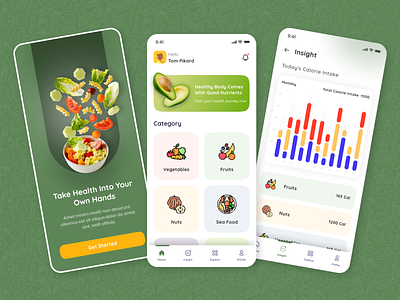
Embarking on a journey towards a healthier lifestyle involves setting specific goals, making changes to your diet, and tracking your progress. One tool that can significantly support you in this endeavor is a nutrition tracker. Whether you're aiming to lose weight, gain muscle, or simply improve your overall well-being, a nutrition tracker can provide valuable insights and help you stay on course. Let's explore how incorporating a nutrition tracker into your routine can enhance your efforts and lead you toward success.
The Benefits of Using a Nutrition Tracker
Accuracy and Awareness
- A nutrition tracker allows you to accurately monitor your daily food intake, including calories, macronutrients (carbohydrates, protein, fats), and micronutrients (vitamins and minerals).
- By inputting your meals and snacks, you gain a better understanding of your eating habits and can identify areas where you may need to make adjustments.
- Tracking your nutrition can also raise awareness about portion sizes and the nutritional content of different foods, helping you make more informed choices.
Goal Setting and Monitoring
- Setting specific nutrition goals, such as consuming a certain number of calories or reaching a target protein intake, becomes more manageable with a nutrition tracker.
- You can track your progress towards these goals in real-time, making it easier to stay motivated and accountable.
- Regularly monitoring your food intake and comparing it to your goals allows you to make adjustments as needed to ensure you're on the right track.
How to Make the Most of Your Nutrition Tracker
Choose a User-Friendly App or Tool
- There are numerous nutrition tracking apps available, ranging from simple to more advanced options.
- Consider your preferences and lifestyle when selecting a tracker, ensuring that it's easy to use and aligns with your goals.
- Look for features such as barcode scanning, recipe analysis, and meal planning to streamline the tracking process and make it more convenient.
Be Consistent and Honest
- For accurate results, it's essential to consistently track everything you eat and drink throughout the day.
- Don't forget to include snacks, condiments, and beverages, as these can contribute to your overall calorie and nutrient intake.
- Be honest with yourself when logging your food choices, as this will provide a true reflection of your eating habits and help you make positive changes.
Tracking Beyond Food: The Importance of Lifestyle Factors
Physical Activity
- Many nutrition trackers also allow you to log your physical activity and exercise routines.
- By monitoring both your food intake and energy expenditure, you can better understand the balance between calories consumed and calories burned.
- Including exercise in your tracking can help you optimize your nutrition plan and achieve your fitness goals more effectively.
Hydration and Sleep
- Don't overlook the impact of hydration and sleep on your overall well-being.
- Some nutrition trackers offer features to monitor your water intake and sleep patterns, providing a comprehensive view of your daily habits.
- Ensuring adequate hydration and quality sleep can support your nutritional efforts and enhance your overall health and performance.
Conclusion
A nutrition tracker can be a powerful tool in achieving your health and fitness goals. By providing accurate data, fostering awareness, and supporting goal setting, a nutrition tracker empowers you to make informed decisions and stay on track towards success. Remember to choose a tracker that suits your needs, stay consistent in your tracking efforts, and consider incorporating lifestyle factors beyond food for a holistic approach to wellness. With the support of a nutrition tracker, you can nourish your body, track your progress, and ultimately achieve the success you desire.